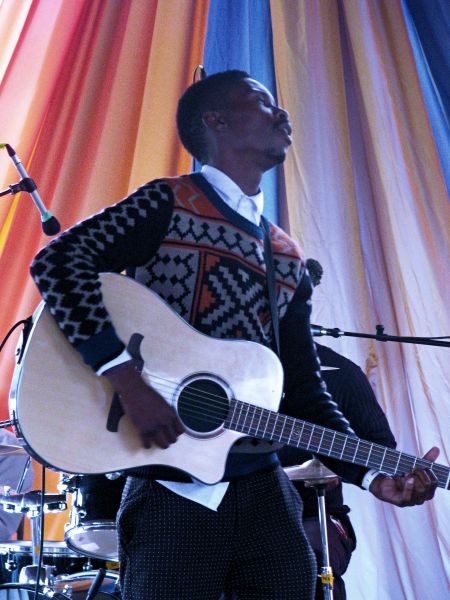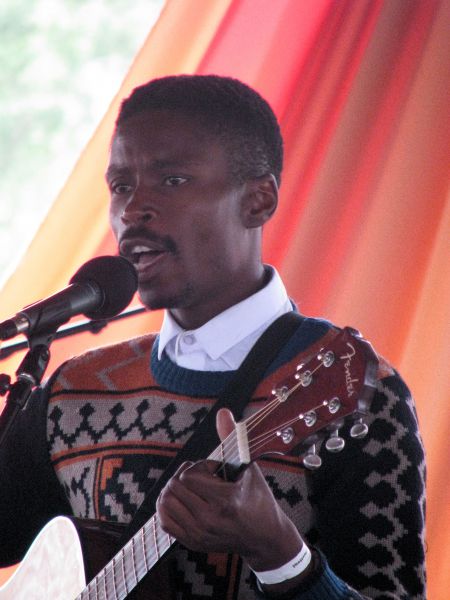STORY about Indigenous posted on August 4, 2015 by Kerry Coast
Songs of Freedom: A South African in Canada
Bongeziwe Mabandla played the Mission Folk Music Festival and kindly shared some thoughts on racism, apartheid, capitalism and Canada’s “big, well-kept secret.”
In 1994, South African President F.W. deKlerk declared apartheid illegal and called the first election since 1949 where black people could vote. Nelson Mandela was elected President at the head of the African National Congress.
“I was nine years old,” says Bongeziwe Mabandla, Xhosa, from South Africa. “Yeah I remember it. Even though I was a kid I was very aware of what was happening.”
Mabandla is a rising star for South Africa, playing a stunning fusion of traditional vocal style and American folk protest music. His recent visit to Canada felt like a breath of freedom, here where the hated Indian Act that was used as a model for South African apartheid is still in force. Mabandla’s music is “moving past it” in chords and melodies of tangible emancipation.
"I wanted to write from the young, black, working class situation. I wanted to put out the story about the rich man – because it’s really about capitalism and a society where the people are so poor they can’t afford to make any mistakes.”
But what were the most important drivers of change in South Africa, moving black people out of half a century of social, civil and political segregation? What can we learn, here where Indigenous culture is broadcast on separate TV channels, recognized in separate media awards ceremonies; where Indigenous poverty and reserve lands are comparable to the black townships of 1980’s South Africa?
“It’s hard to really pinpoint one thing that brought down apartheid. So many people had spent their whole lives trying to destroy it. Some had left their families and, by the time 1994 came, some people had been in jail for as long as 27 years. Whether it was through songs or art or exile protest, there were different forms …it was definitely not just one contributing factor. It was a kind of force where the pressure was coming in from many different ways and many different people from inside and outside South Africa, many white South Africans, and the youth, and the uprisings, and the people becoming stronger.”
Do South Africans see a connection between what they have accomplished and a possible future for other places in the world, places that are paralyzed by double standards where Indigenous Peoples are targeted by police, kept in poverty, denied their lands?
“I actually got to come to Canada because of a tour I did in Australia. I met some Indigenous people from Canada. I did know about the big, well-kept secrets of Canada and Australia. You know, some people look at South Africa and think the worst things happened there – but the ways and methods they killed people were sometimes, in other places, even more violent, where they would mass poison people.
“I don’t see a lot of native people here (at the festival), or just in general. I wonder where they are.”
The Indian Residential School era and other major details of the Canadian offensive against Indigenous Peoples are not well known in South Africa. “It makes the atrocity and the crime that much bigger when you are able to wipe out so much and take over so much of a population.”
“And what’s happening in the States, what happens when you are born black. We see our people – across the world – and the darker you are, the worse you are treated. It’s across the world, actually. I don’t know if people understand what it means, when a black child is born into that situation, they form their own identities and their own characters, being born ‘on the wrong side of the track.’”
The song titled “Gunuza” is about the rich man on the block where Bongeziwe grew up, and everyone used to smile and wave at the rich man – until they realized “perhaps he was not such a good person.”
This song and many others are “definitely wondering, where do you get your sense of being, when you are born as a factory worker’s daughter or son? How do you build yourself up, when working hard is not enough? How do you build yourself and raise yourself up to be a confident, happy, respectful person? A lot of it was written from that.”
Bongeziwe Mabandla played at the 28th annual Mission Folk Music Festival, July 24-26. Check out his music!
The Mission Folk Music Festival 2015 featured 4th generation Galician singers Ialma; the Carpathian string quintet Volosi; Irish, Scottish and Canadian violin and pipes players; Black Umfolosi of Zimbabwe; Mongolian minstrels Haya; and many more regional superstars from around the world. As well as showcasing musicians on the main stage, this annual music festival brings together artists from across the globe into performance workshops where strings meet throat singers and a cappella singing groups come together – singing in different languages. Check out the Festival next summer for the songs of protest, peace and freedom from peoples around the world.
The site for the Vancouver local of The Media Co-op has been archived and will no longer be updated. Please visit the main Media Co-op website to learn more about the organization.

